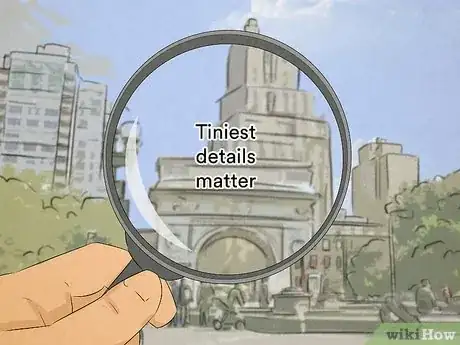This article was co-authored by wikiHow staff writer, Madeleine Flamiano. Madeleine Flamiano is an Editing Fellow at wikiHow based in Berkeley, California, as well as a Team Organizer, Copy Editor, and Movie Critic for Incluvie. Madeleine has 12 years of experience in literacy advocacy and the creative arts that span tutoring, teaching, writing, public relations, and non-profit support. She has penned seven novels under a pseudonym and loves all escapist genres, from cozy fantasies to hard-boiled sci-fi. Her professional path started at NaNoWriMo, where she scripted and hosted a series on worldbuilding. Madeleine graduated from Mills College with a B.A. in English with a concentration in Literature and a Minor in Philosophy.
There are 13 references cited in this article, which can be found at the bottom of the page.
This article has been viewed 2,961 times.
Learn more...
Tempted to use the idiom "the devil is in the details," but want to make sure you get it just right? To help you play innocent like you've known how to drop it in a discussion all along, we'll give you a thorough run-down. Not only will we tell you what "the devil is in the details" means, but we'll also reveal its origins. Then, we'll share examples of different situations where you can use it. Finally, we'll review some variations of this phrase. Here, you'll get into the nitty gritty of "the devil is in the details" and master this expression!
Things You Should Know
- "The devil is in the details" refers to situations that seem simple at first but actually have important details you need to take into account.
- The phrase "the devil is in the details" became popular between 1821 and 1969. It was even featured in Bartlett's Familiar Quotations in 1969.
- You can say "the devil is in the details" in business settings, but you can also use it in casual conversations.
- There are variations on the idiom "the devil is in the details," like "God is in the details," or "the devil is in the details — so are the angels."
Steps
Origin
-
1”The devil is in the details” evolved from the phrase “God is in the details.” Somewhere between 1821 and 1969, the phrase “God is in the details" became popularized. This saying indicates that hard work and discipline is required for any project. It might’ve been first used in a college seminar by art historian Aby Warburg, who was born in 1866 and lived until 1929.[1] However, the phrase is widely attributed to German architect Ludwig Mies van der Rohe, whose life spanned from 1886 to 1969.[2]
- The New York Times cited Ludwig Mies' iconic expression in his obituary, which might've caused a surge in its usage.
-
2In 1963, “the devil is in the details” was used to discuss rebuilding Europe after WWII. After World War II, Foreign Ministers met in Europe to make important decisions about how to enter negotiations and assist countries devastated by invasion. Richard Maynard wrote an account of this committee meeting in 1963 and noted that all the officials had to remember that “the devil is in the details.”[3]
-
3In 1965, “the devil is in the details” was accepted as a proverb by Newsweek. In its 65th volume, the magazine called this expression a "proverb," a popularly used phrase that provides a piece of advice. This publication might've promoted "the devil is in the details" enough that it entered everyday conversation from the mid-60's to today.[4]
- In 1969, "the devil is in the details" was also listed in Bartlett's Familiar Quotations.[5]
References
- ↑ https://archive.org/details/memorymetaphorab00john/page/44/mode/2up
- ↑ https://poemanalysis.com/proverb/the-devil-is-in-the-details/
- ↑ https://archive.org/details/communityofeurop00mayn/page/92/mode/2up
- ↑ Newsweek. Vol. 65, no. 1. Newsweek Inc. 1965. p. 173.
- ↑ Bartlett, John (November 2002). Bartlett's Familiar Quotations (17th ed.). Little, Brown and Company.
- ↑ https://learningsolutionsmag.com/articles/1580/project-management-the-devil-is-in-the-details
- ↑ https://idiomation.wordpress.com/2014/01/22/the-devil-is-in-the-details/
- ↑ https://www.pastemagazine.com/tv/apple-tv-plus/black-bird-episode-5-review-disturbing/
- ↑ https://www.planetclaire.tv/quotes/psych/season-four/the-devils-in-the-details-and-the-upstairs-bedroom/
- ↑ https://www.nytimes.com/1989/07/30/magazine/on-language-who-s-in-those-details.html
- ↑ https://www.firehousetheatre.org/single-post/2019/01/30/the-devil-is-in-the-details-but-so-are-the-angels
- ↑ https://link.springer.com/chapter/10.1007/978-3-319-58978-7_4
- ↑ https://journals.lww.com/ccmjournal/Citation/2008/04000/_The_truth,_if_it_exists,_is_in_the_details__.50.aspx







































































